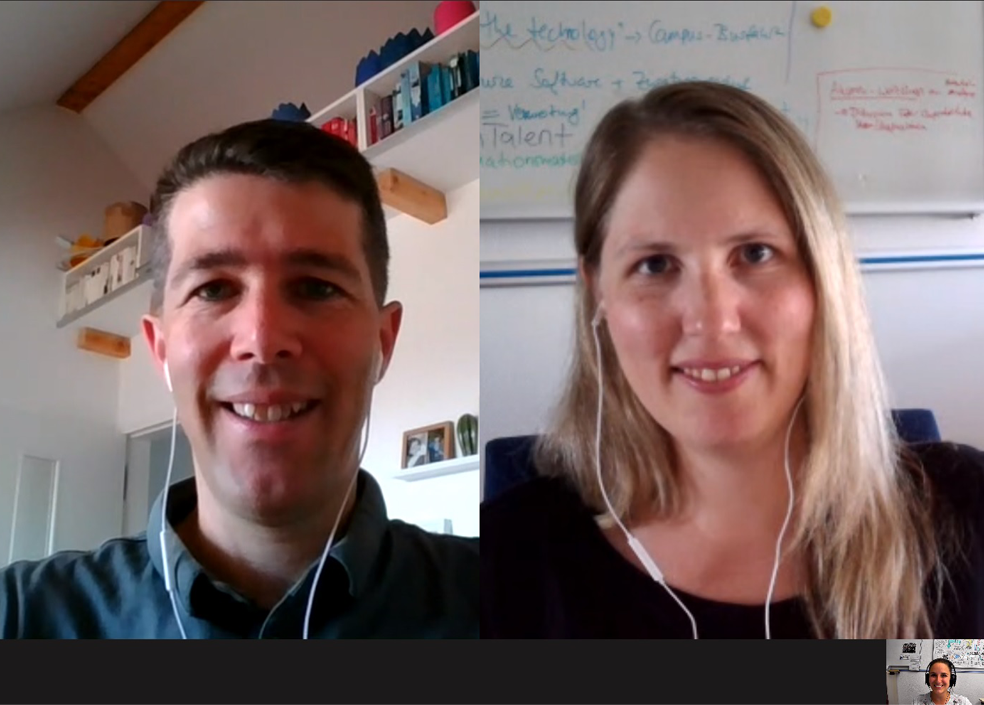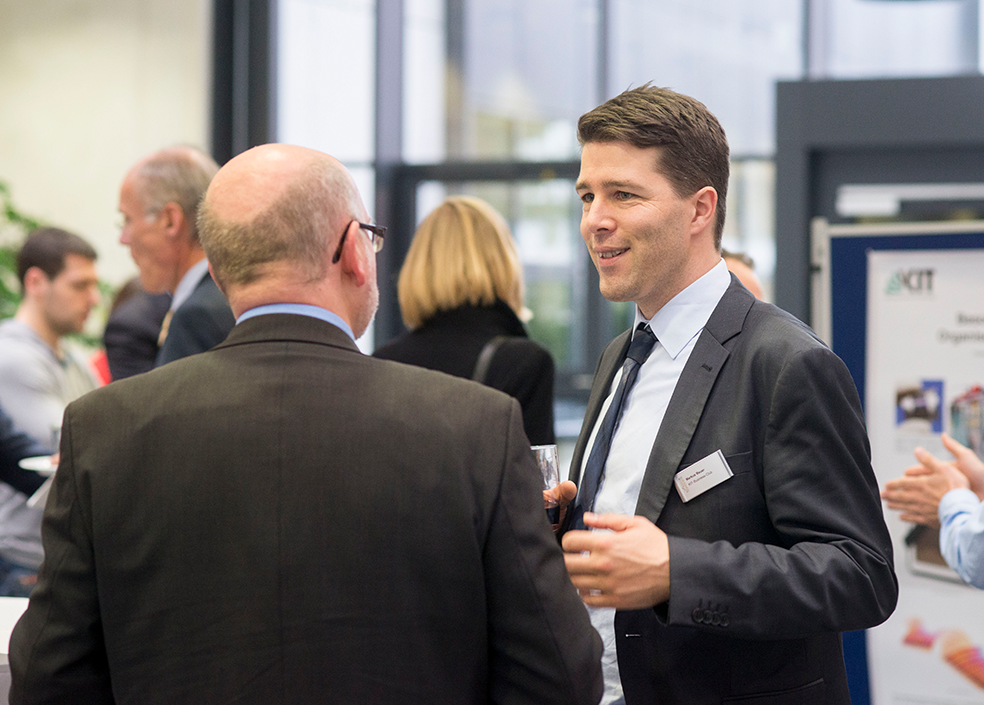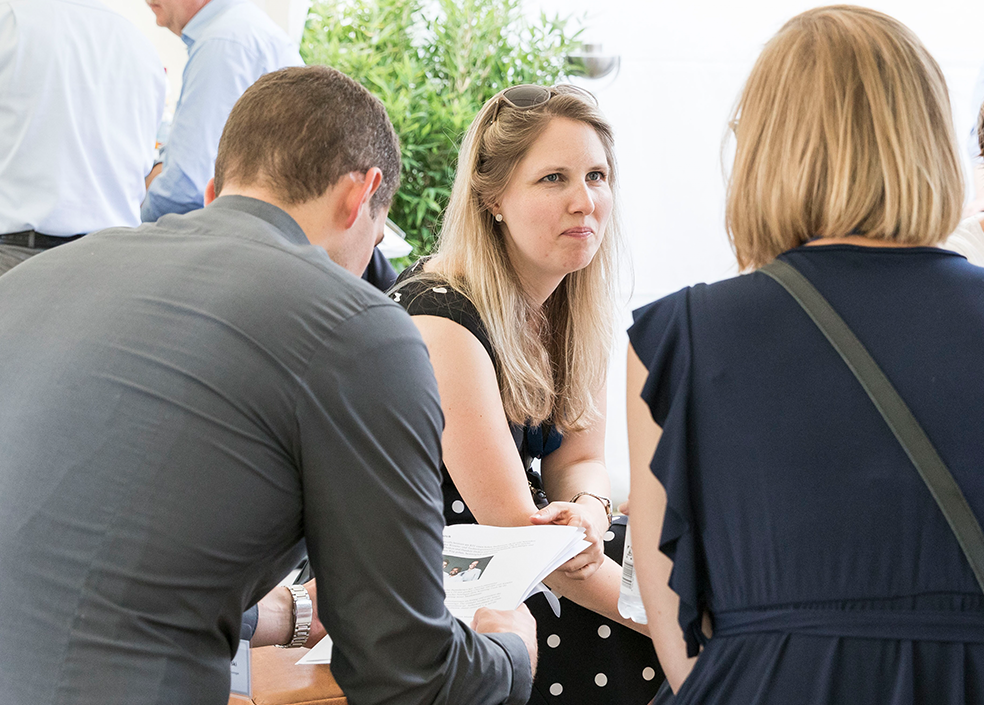Published on July 30, 2020
Pandemic and personal networks

Since 2017, Laura Bosch has been building up the KIT Industry Experts Network, which aims to enthuse KIT alumni for a close exchange in the field of knowledge and technology transfer. The network has about 160 members, mainly company representatives.
Dr. Markus Bauer heads the KIT Business Club, which acts as a direct broker between companies and scientists, initiating innovation projects and promoting the establishment of personal and sustainable contacts between the two sides.
Before the beginning of the pandemic, both networks relied on events as the most important platform for meetings. These included self-organised network meetings, fireside evenings or theme days. However, other major events or trade fairs were also used to bring members together. In an interview, they told us how they keep their communities going and what lessons they have learned from the past months.
How are you and your networks doing after months of contact restrictions?
Markus Bauer: The KIT Business Club is active and we have also exchanged directly with the vast majority of our member companies during the last months. Of course, contact and discussions have shifted to the digital world. We could not offer the club events as they were offered before. Therefore we have experimented and, for example, organized the digital series of topics KIT Insights with impulse lecture and discussion.
Laura Bosch: It was important for us to remain visible at all. We have observed an interesting development: The changed work situation with cancelled appointments and business trips meant that individuals were even easier for us to reach and were able to make binding commitments at shorter notice than before. For example, we were able to find mentors from the network for doctoral researchers at KIT very quickly. These people would certainly not have been able to plan this so easily beforehand due to their busy schedules.

Is there a digitalisation boost in technology transfer?
Laura Bosch: That depends on which area you are looking at. A good thing is that almost all institutions and companies have developed a new openness to try out alternative formats. Replacing business trips in part with video meetings makes lasting sense and saves time. Digital trade fairs, webinars and exchange formats have never been tested so intensively before. Like everywhere else, we must gradually draw conclusions in technology transfer concerning what is suitable for perpetuation, even after the pandemic.
Markus Bauer: And despite all the joy of experimentation and all the learning effects we have had in the past months: there are not only positive things. Some things just don't really transpose into digital space.
What do you miss with digital formats?
Markus Bauer: The personal aspects and the coincidence! Take a network meeting with several dozen participants. One of the most important effects of these events does not take place in the workshops or lectures, but during the breaks. At the bar table, where by pure chance four or five strangers gather for dinner, it is not uncommon for joint projects to begin. Of course there are formats such as breakout rooms, but experience shows that they are more likely to be used for thematic discussions than for a spontaneous meeting of strangers. We are really looking forward to having the personal exchange on site again at some point.
Laura Bosch: Absolutely, one looks forward to the informal atmosphere of such meetings and to exchanging ideas with people outside the normal professional framework, whom one has known for years. We also lack the opportunity to bring external guests to the laboratories. The state of the art of a technology, the potential it offers and the scientists behind it are all easier for our members to grasp if they experience it on site.

How do you plan the coming period for the KIT Business Club and the KIT Industry Experts?
Laura Bosch: Our orientation here is twofold. I believe that a certain saturation of digital offerings is now occurring. We are therefore attempting to bundle and make a meaningful selection for the experts. Nevertheless, we want to work to ensure that the exchange between the experts can take place more intensively, also digitally. We are dealing with the possibilities to digitally represent the contact driven by chance and we also take the activities of colleagues at KIT as a model, for example the KIT Alumni Network.
Markus Bauer: We are planning further webinars in the fall as part of the KIT Insights series. In addition, we are trying to clarify in discussions which business areas are becoming more important and promising for our members in view of the current changes and what we can offer in these subject areas. Nobody knows how the infection process will affect us and our member companies in the further course of the year. However, we firmly plan to be able to organize events on site at the KIT to a limited extent and hope very much that this will be possible.
The interview was conducted by Anke Weigel

comments about this article
No Comments